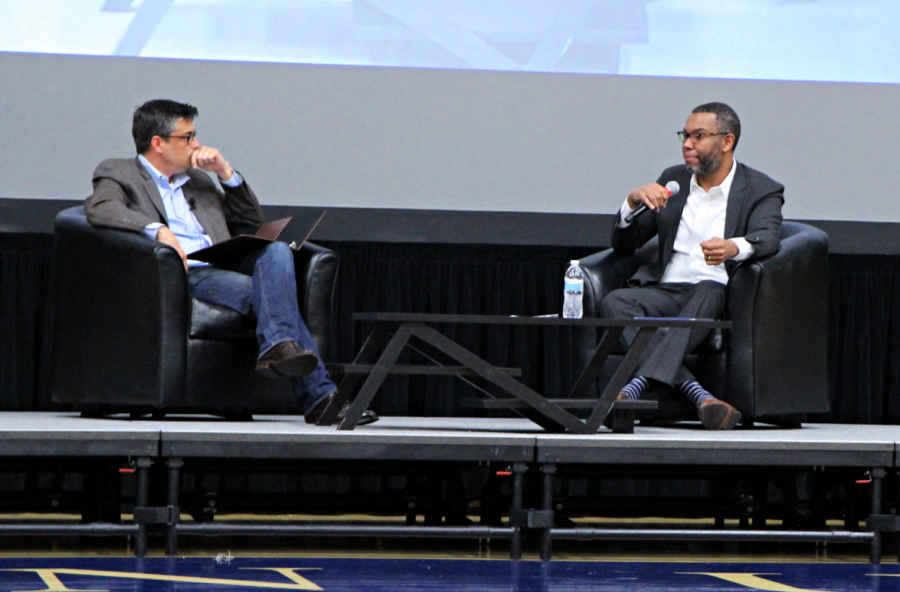A reflection on a Conversation with Ta-Nehisi Coates
April 30, 2019
A conversation with Ta-Nehisi Coates was held at 6 p.m. April 25 at Lee Arena. Coates is an established writer in residence at New York University’s Arthur L. Carter Journalism Institute. His book “Between The World and Me” won the National Book Award in 2015. He is also the author of the bestselling books “The Beautiful Struggle,” “We Were Eight Years in Power” and Marvel comics “The Black Panther” and “Captain America.”
Tanner Colby, author of “Some of My Best Friends Are Black,” facilitated questions for Coates and weighed in on Coates’ responses.
“Over the past, I would say 10 years, I have had opportunity to travel around the country to visit various historical sites, specifically with interest to actually the Civil War and enslavement,” Coates said. “Nevertheless, being here, it is not hard to recognize the significance of this sign and what happened in the struggle that links on the period of slavery, 250 years of enslavement in this country, to the model that was fought to end that period of enslavement.”
When discussing the impact of Brown v. Board and the steps it took to get to that point, Coates highlighted the Supreme Court’s previous unkindness to those who were not white people.
“First thing to recognize is what we have to grapple with, in terms of fight against racism in this country and against white supremacy, I would not categorize the supreme court as a friend in that fight institution…Think about the Dred Scott decision, which ruled that no black man has any rights that any white man is common to respect that any number you think about the striking down of the civil rights legislation, underground or reconstruction was held in reconstruction, there are a number of really retrograde cases,” Coates said.
Colby has been conducting research about South African political projects regarding the concept of whiteness. Colby shared his theory on what whiteness means and asked Coates for any theories he might have. Coates discussed how, though he doesn’t have any theories on whiteness, he does believe in the minds of many. Being white means being powerful. He illustrated this using an example of giving up one’s race.
“You know, we want our food, we want our way of talking, our dances. We don’t want to give none of that up. But to give up race, we would give that up in a second. We would very easily pilot that. Giving up race means I’m not going to be profiled anymore…I won’t have to worry about cops anymore, but I can keep my mac and cheese,” Coates said.
Coates clarified that they are talking about the abolition of power based on certain features.
“So, the extent to which that power is intertwined with so much of America’s history. I think, along with that abolition, it has to be a very, very serious record in the fact that enslavement, the period of Jim Crow and our homegrown terrorism afterwards. One can certainly include the ethnic cleansing of Native Americans in this country; if you follow those two, you know, ongoing senses together, we have not exactly lived up to the promises we made of ourselves and our documents [U.S. Constitution].”
Jack Williamson, senior history and English double major, enjoyed the discussion on some of the hot topics that make some uncomfortable.
“It was interesting to have a very frank discussion about some topics that are easy to get uncomfortable with, and I think he did a really good job of breaking things down and making big topics seem a lot less scary, like reparations, being one of them is a lot easier to understand them. In terms of harm, you understand reparations in terms of race as an example,” Williamson said. “The reparations topic was probably the biggest thing I felt like. It’s a lot easier to think about reparations when you know and how doable it actually is. It’s not like reparations isn’t just giving every black person in America a certain amount of money. It is finding where racism has impacted black people and trying to make that right. It’s not just a blanket, impossible thing to do. It’s a doable thing.”
Kerry Wynn, associate professor from the history department, talked about Coates’ take on politics.
“It was a really interesting discussion and I thought that it was very thought-provoking,” Wynn said. “I really appreciate Mr. Coates’ takes on politics, and that he was really receptive, and I think it raised a lot of questions about our future.”



